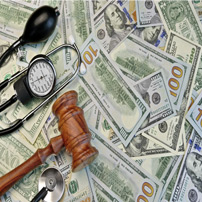Anti-Kickback Statute vs. Stark Law
July 13, 2018 Physicians and health care professionals should be familiar with and know the distinctions between the Anti-Kickback Statute (AKS) and Stark Law. These laws apply to doctors receiving compensation for inappropriate referrals. Understanding the differences between the two can avoid potential problems for physicians and their practices.
Physicians and health care professionals should be familiar with and know the distinctions between the Anti-Kickback Statute (AKS) and Stark Law. These laws apply to doctors receiving compensation for inappropriate referrals. Understanding the differences between the two can avoid potential problems for physicians and their practices.
Anti-Kickback Statute: The Basics
AKS is a federal health care fraud and abuse law. It prohibits transactions that may encourage or give referrals for services or items that can be reimbursed by federal health care programs. It was created to target corruption, and to protect patients that benefit from federal health care programs. It is designed to prevent anyone from offering or receiving any payment in return for referring an individual to another person for service reimbursed by a federal health care program or recommending any service reimbursed by a federal health care program.
Requesting or accepting money or anything of value for referrals for Medicare or Medicaid is illegal and offering or making these payments is also against the law. Intent must be proven in these cases. There are exceptions for AKS violations called Safe Harbors. These include payments to actual employees, certain business and payment practices, and investments in certain surgical centers.
How Stark Law Works
Stark Law is also referred to as the self-referral law and prohibits doctors from referring designated health services that are paid by Medicare or Medicaid to a person or business that they have a financial relationship with. This could be themselves, an immediate family member, a business ownership, or investment. There are exceptions that can apply, although they have detailed conditions that must be met.
The health services that fall under this law include physical and occupational therapies, lab services, radiology and imaging, radiation, durable medical equipment, prosthetic devices, prescription drugs, home health services, and inpatient or outpatient hospital services. Proof of intent is not required for overpayment, but it is required for knowing violations. There are exceptions that may apply for Stark Law violations.
How the Penalties Differ
Restitution for Anti-Kickback violations can be quite severe and include criminal and civil penalties. The fines can be substantial and assessed up to $25,000 for each violation. Offenders can also end up serving five years of jail time per violation. Civil penalties include additional monies that can reach $50,000, plus up to three times the total amount of the kickback. Physicians can also be liable under the False Claims Act and be excluded from the Federal Healthcare Program.
The consequences for Stark Law violations are somewhat less severe. Physicians are obligated to reimburse overpayments, and are subject to financial penalties, which can be up to $15,000. These do not include civil assessments of possibly three times the amount that was claimed. False Claims Act liability and Federal Healthcare Program exclusion for knowing violations also apply.
Philadelphia Health Care Lawyers at Sidney L. Gold & Associates, P.C. Provide Physicians with Personalized Legal Services
If you have been charged with violating the Anti-Kickback Statute or Stark Law, we can help. Contact a knowledgeable Philadelphia health care lawyer at Sidney L. Gold & Associates, P.C. by calling 215-569-1999, or complete our online contact form to schedule a consultation today. We are in Philadelphia, and we serve clients from the surrounding areas, including Bucks County, Chester County, Delaware County, Montgomery County, and the state of New Jersey.




























